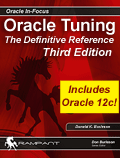| |
 |
|
Oracle SQL with multiple versions in the library cache
Oracle Database Tips by Donald Burleson |
When a SQL statement is executed with
multiple child cursors, multiple versions are created within the
library cache of the shared pool. You can query the
v$sqlarea view for details on child cursors, using the
sharable_mem and persistent_mem columns.
You can also query the v$sql view columns,
greatly enhanced in 10g:
- SHARABLE_MEM - Amount of shared memory
used by the child cursor (in bytes)
- PERSISTENT_MEM - Fixed amount of memory
used for the lifetime of the child cursor (in bytes)
- INVALIDATIONS - Number of times this child
cursor has been invalidated
- PARSE_CALLS - Number of parse calls for
this child cursor
- DISK_READS - Number of disk reads for this
child cursor
- DIRECT_WRITES - Number of direct writes
for this child cursor
- BUFFER_GETS - Number of buffer gets for
this child cursor
- PARSING_USER_ID - User ID of the user who
originally built this child cursor
- PARSING_SCHEMA_ID - Schema ID that was
used to originally build this child cursor
- PARSING_SCHEMA_NAME - Schema name that was
used to originally build this child cursor
- KEPT_VERSIONS - Indicates whether this
child cursor has been marked to be kept pinned in the cache using the
DBMS_SHARED_POOL package
- ADDRESS - Address of the handle to the
parent for this cursor
- TYPE_CHK_HEAP - Descriptor of the type
check heap for this child cursor
- CHILD_ADDRESS - Address of the child
cursor
For working scripts against these views, see
the Oracle script collection.
The STATSPACK report scripts sprepsql.sql
and sprsqins.sql scripts are used to generate the STATSPACK report for
SQL statements, statistics and plan usage. These STATSPACK SQL report (in $ORACLE_HOME/admin/rdbms/admin)
shows the shareable memory used by a SQL cursor, and it's the sum of all memory
used by the SQL, including child cursors.
Steve Adams notes
the library cache structures for SQL with multiple children and the multiple
cursor structure within the shared pool library cache:
"For each SQL statement the library cache contains a "parent" cursor for
the text of the SQL statement.
The parent cursor is comprised of a "handle" that can be looked up by
hash value via the library cache hash table, and an "object" that contains
pointers to each of its "child" cursors.
Each child cursor is also comprised of a handle and an object. The child
object is comprised of two heaps numbered 0 and 6. Heap 0 contains all the
identifying information for a particular version of the SQL statement and
heap 6 contains the execution plan. This distinction between parent and
child cursors is maintained even when there is only one version of each SQL
statement.
For parent cursors the convention used in the X$ tables is that the parent
address is the same as the handle address. V$OPEN_CURSORS, V$SQL and so on
are only interested in child cursors and so they exclude parent cursors by
requiring that the two addresses are different. The columns that you
mentioned are of course the two addresses."
In statspack you can use the collection
threshold p_def_version_count_th to govern the threshold for the
SQL child cursors. I have more details on SQL tuning in my book
"Oracle
Tuning: The Definitive Reference".
Frank Pachot published this nice SQL, intended
to be run right after an SQL is executed, using
v$session.prev_sql_addr:
"When you have the same statement
that has several versions (child) the view v$sql_shared_cursor shows
the reason why the statement cannot be shared. More detail on reasons
in MOSC note 120655.1":
select
version_count,address,hash_value,parsing_schema_name,reason,sql_text from (
select
address,''
||decode(max(
UNBOUND_CURSOR),'Y',
' UNBOUND_CURSOR')
||decode(max(
SQL_TYPE_MISMATCH),'Y',
' SQL_TYPE_MISMATCH')
||decode(max(
OPTIMIZER_MISMATCH),'Y',
' OPTIMIZER_MISMATCH')
||decode(max(
OUTLINE_MISMATCH),'Y',
' OUTLINE_MISMATCH')
||decode(max(
STATS_ROW_MISMATCH),'Y',
' STATS_ROW_MISMATCH')
||decode(max(
LITERAL_MISMATCH),'Y',
' LITERAL_MISMATCH')
||decode(max(
SEC_DEPTH_MISMATCH),'Y',
' SEC_DEPTH_MISMATCH')
||decode(max(
EXPLAIN_PLAN_CURSOR),'Y',
' EXPLAIN_PLAN_CURSOR')
||decode(max(
BUFFERED_DML_MISMATCH),'Y', '
BUFFERED_DML_MISMATCH')
||decode(max(
PDML_ENV_MISMATCH),'Y',
' PDML_ENV_MISMATCH')
||decode(max(
INST_DRTLD_MISMATCH),'Y',
' INST_DRTLD_MISMATCH')
||decode(max(
SLAVE_QC_MISMATCH),'Y',
' SLAVE_QC_MISMATCH')
||decode(max(
TYPECHECK_MISMATCH),'Y',
' TYPECHECK_MISMATCH')
||decode(max(
AUTH_CHECK_MISMATCH),'Y',
' AUTH_CHECK_MISMATCH')
||decode(max(
BIND_MISMATCH),'Y',
' BIND_MISMATCH')
||decode(max(
DESCRIBE_MISMATCH),'Y',
' DESCRIBE_MISMATCH')
||decode(max(
LANGUAGE_MISMATCH),'Y',
' LANGUAGE_MISMATCH')
||decode(max(
TRANSLATION_MISMATCH),'Y', '
TRANSLATION_MISMATCH')
||decode(max(
ROW_LEVEL_SEC_MISMATCH),'Y', '
ROW_LEVEL_SEC_MISMATCH')
||decode(max(
INSUFF_PRIVS),'Y',
' INSUFF_PRIVS')
||decode(max(
INSUFF_PRIVS_REM),'Y',
' INSUFF_PRIVS_REM')
||decode(max(
REMOTE_TRANS_MISMATCH),'Y', '
REMOTE_TRANS_MISMATCH')
||decode(max( LOGMINER_SESSION_MISMATCH),'Y',
' LOGMINER_SESSION_MISMATCH')
||decode(max(
INCOMP_LTRL_MISMATCH),'Y', '
INCOMP_LTRL_MISMATCH')
||decode(max(
OVERLAP_TIME_MISMATCH),'Y', '
OVERLAP_TIME_MISMATCH')
||decode(max(
SQL_REDIRECT_MISMATCH),'Y', '
SQL_REDIRECT_MISMATCH')
||decode(max(
MV_QUERY_GEN_MISMATCH),'Y', '
MV_QUERY_GEN_MISMATCH')
||decode(max(
USER_BIND_PEEK_MISMATCH),'Y', '
USER_BIND_PEEK_MISMATCH')
||decode(max(
TYPCHK_DEP_MISMATCH),'Y',
' TYPCHK_DEP_MISMATCH')
||decode(max(
NO_TRIGGER_MISMATCH),'Y',
' NO_TRIGGER_MISMATCH')
||decode(max(
FLASHBACK_CURSOR),'Y',
' FLASHBACK_CURSOR')
||decode(max(
ANYDATA_TRANSFORMATION),'Y', '
ANYDATA_TRANSFORMATION')
||decode(max(
INCOMPLETE_CURSOR),'Y',
' INCOMPLETE_CURSOR')
||decode(max(
TOP_LEVEL_RPI_CURSOR),'Y', '
TOP_LEVEL_RPI_CURSOR')
||decode(max(
DIFFERENT_LONG_LENGTH),'Y', '
DIFFERENT_LONG_LENGTH')
||decode(max(
LOGICAL_STANDBY_APPLY),'Y', '
LOGICAL_STANDBY_APPLY')
||decode(max(
DIFF_CALL_DURN),'Y',
' DIFF_CALL_DURN')
||decode(max(
BIND_UACS_DIFF),'Y',
' BIND_UACS_DIFF')
||decode(max(
PLSQL_CMP_SWITCHS_DIFF),'Y', '
PLSQL_CMP_SWITCHS_DIFF')
||decode(max(
CURSOR_PARTS_MISMATCH),'Y', '
CURSOR_PARTS_MISMATCH')
||decode(max(
STB_OBJECT_MISMATCH),'Y',
' STB_OBJECT_MISMATCH')
||decode(max(
ROW_SHIP_MISMATCH),'Y',
' ROW_SHIP_MISMATCH')
||decode(max(
PQ_SLAVE_MISMATCH),'Y',
' PQ_SLAVE_MISMATCH')
||decode(max(
TOP_LEVEL_DDL_MISMATCH),'Y', '
TOP_LEVEL_DDL_MISMATCH')
||decode(max(
MULTI_PX_MISMATCH),'Y',
' MULTI_PX_MISMATCH')
||decode(max(
BIND_PEEKED_PQ_MISMATCH),'Y', '
BIND_PEEKED_PQ_MISMATCH')
||decode(max(
MV_REWRITE_MISMATCH),'Y',
' MV_REWRITE_MISMATCH')
||decode(max(
ROLL_INVALID_MISMATCH),'Y', '
ROLL_INVALID_MISMATCH')
||decode(max(
OPTIMIZER_MODE_MISMATCH),'Y', '
OPTIMIZER_MODE_MISMATCH')
||decode(max(
PX_MISMATCH),'Y',
' PX_MISMATCH')
||decode(max(
MV_STALEOBJ_MISMATCH),'Y', '
MV_STALEOBJ_MISMATCH')
||decode(max( FLASHBACK_TABLE_MISMATCH),'Y',
' FLASHBACK_TABLE_MISMATCH')
||decode(max(
LITREP_COMP_MISMATCH),'Y', '
LITREP_COMP_MISMATCH')
reason
from
v$sql_shared_cursor
group by
address
) join v$sqlarea using(address) where version_count>&versions
order by version_count desc,address
;
 |
If you like Oracle tuning, see the book "Oracle
Tuning: The Definitive Reference", with 950 pages of tuning tips and
scripts.
You can buy it direct from the publisher for 30%-off and get
instant access to the code depot of Oracle tuning scripts. |
|

|
|
